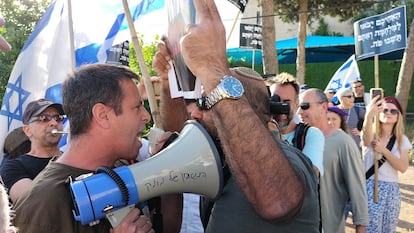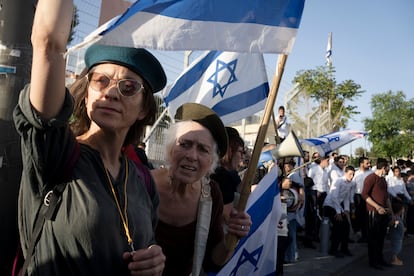Protests against judicial reform in Israel reveal tensions with ultra-Orthodox Jews
Demonstrations target military and economic ‘burden-sharing,’ consumer price hikes and the separation of religion and state

Israeli protest movement leaders declared May 4 as National Equality Day and faced off with counter-demonstrators in Jerusalem’s Bayit VeGan neighborhood. Separated by a handful of police officers, the two sides hurled angry words at each other like flaming arrows. To protest the Benjamin Netanyahu government’s judicial reforms, they marched in front of a Talmudic school to denounce the exemption of ultra-Orthodox Jews from compulsory military service. They wore military caps and chanted “We want democracy!” and “Equality for all!” On the other side were ultra-Orthodox Jews and people from other factions of Israel’s ruling right-wing coalition. They greeted the protestors with shouts of “Leftists! Traitors!” and “We are defending you through the Torah!” Some yelled, “64 Knesset members,” referring to the right-wing majority in Israel’s parliament that elected Netanyahu as prime minister. They tossed water on the protestors and tried to steal their flags. Some just gave them the middle finger.
“Don’t touch me,” warned a secular demonstrator to the young man yelling in her face.
“I wouldn’t want to touch you,” he said as another guy warned him that getting so close to a woman is blasphemy.
The two sides numbered less than 100, but the tension was palpable and they almost came to blows. They were fairly evenly matched, just like the nation’s divide over the judicial reform that has exposed the country’s long-running societal strife: secular versus religious, centrists versus both wings, Ashkenazi versus Mizrahi, and so on. The outrage that has mobilized hundreds of thousands of Israelis every week since January is increasingly spreading to other divisive issues, especially what Israelis call “burden-sharing.” Much of the country wants ultra-Orthodox men and women to share the economic and military burden.
The ultra-Orthodox are exempt from Israel’s military service, which is 32 months for men and 24 months for women. Instead of working, they often devote themselves to religious activities for which they receive financial subsidies. The ultra-Orthodox comprise 13% of the population and have an average of seven children in each family. According to Israel’s Central Bureau of Statistics, ultra-Orthodox Jews will comprise 32% of the population by 2065.
“I’m not saying they have to serve like the rest of us, but they should do one or two years of social service instead. We shouldn’t exempt a group supported by our taxes from collective responsibility,” said Micha Weiss, a 59-year-old demonstrator waving an Israeli flag. The nation’s flag has become a symbol of the movement against judicial reforms that would give the executive branch unprecedented control over the Supreme Court, which is practically the only institutional counterbalance in the government. Weiss believes people need to speak out about the country’s issues and defends holding a rally in front of a religious school. “You have to confront the issue, not demonstrate in some other place where there is no problem… I have an 18-year-old son who is going into the army. What if he gets sent to a crazy war over some settlement? And they don’t have to go?”
In a traffic circle across the street, Amnon Avinadav countered the demonstrators with his own shouts. He has come all the way from Tel Aviv and calls them hypocrites. “If they really want equality,” he said, “they should go to Umm al-Fahm and ask them. But they only want to fight the ultra-Orthodox because they hate them,” he said. Umm al-Fahm is a city in the Haifa district, predominantly populated by Arab citizens of Israel, 20% of who are also exempt from military service for various reasons.
The military recruitment office
There was another demonstration that day near Tel Aviv in Bnei Brak, the largest ultra-Orthodox town in the country. In March, the government set up a military recruitment office there. A protestor told us, “Gone are the days when our people serve the country while funding Talmudic schools that seek to build a dictatorship based on Jewish law. There is no democracy without equality.”
In a recent editorial for the Haaretz newspaper Odeh Bisharat, a former secretary general of Hadash (the far-left political coalition formed by the Israeli Communist Party and other leftist groups), wrote: “Part of the Israeli mainstream is obsessed with forcing the ultra-Orthodox to enlist. Even if the army were paradise on earth, you can’t drag people there in chains… In the name of equality, they are trying to force an entire community to do something it doesn’t believe in.”

Ultra-Orthodox Jews are in the eye of the storm, but they did not take part in the large demonstration supporting the judicial reforms in April. And the parties representing them in the ruling coalition have been their least vocal defenders. They support the initiative mainly so the Supreme Court cannot overturn a clear legal exemption to compulsory military service.
After firing Defense Minister Yoav Galant for distancing himself from the judicial reforms, Netanyahu put the initiative on hold in late March under pressure from the widespread opposition. Netanyahu reinstated Galant and withdrew the bill from the Knesset session that began on May 1 and ends in July. In April, while the Knesset was in recess, demonstrators marched every Saturday against the reform as the government and the opposition fruitlessly negotiated at President Isaac Herzog’s residence.
Once the Knesset was back in session, weekly Thursday protests started up again. Many were small but very visible and symbolic expressions of dissent around the country. The large demonstrations also continued, along with the traditional blockade of the Ayalon Highway in Tel Aviv.
More pressing problems
The May 4 protest didn’t just focus on military exemption, but on a host of political issues. The demonstration organizers believe the government is focusing only on judicial reform (presented a week after taking office in late December) instead of more pressing problems.
Demonstrators dyed the water of a Tel Aviv fountain to protest food prices that continue to rise despite Netanyahu’s campaign promise it would be his top priority. They surreptitiously put stickers on milk cartons in supermarkets with messages denouncing the government’s deal with producers that inflated milk prices by 9.2%.
The protest movement also staged a performance in the West Bank Jewish settlement of Kiryat Arba, in front of the home of National Security Minister Itamar Ben-Gvir, a far-right, tough-on-crime hardliner. Their street theater used bloody mannequins to decry the surge in homicides of Palestinians, a minority that comprises 20% of Israel’s population but accounts for 77% of the deaths. So far, 88 homicides have been recorded (five on May 3 alone), double the number for the same period in 2022. The crowd shouted, “You can’t handle the job, Ben-Gvir!” and “Where are you? Step up!”
Others marched in front of Israel’s Chief Rabbinate headquarters in Jerusalem calling for gender equality. In front of the Tel Aviv District Court, a mock same-sex wedding (illegal in Israel) was staged in protest. Dozens more rallied at the home of a drag performer who was stoned by a crowd in late April.
Sign up for our weekly newsletter to get more English-language news coverage from EL PAÍS USA Edition
Tu suscripción se está usando en otro dispositivo
¿Quieres añadir otro usuario a tu suscripción?
Si continúas leyendo en este dispositivo, no se podrá leer en el otro.
FlechaTu suscripción se está usando en otro dispositivo y solo puedes acceder a EL PAÍS desde un dispositivo a la vez.
Si quieres compartir tu cuenta, cambia tu suscripción a la modalidad Premium, así podrás añadir otro usuario. Cada uno accederá con su propia cuenta de email, lo que os permitirá personalizar vuestra experiencia en EL PAÍS.
¿Tienes una suscripción de empresa? Accede aquí para contratar más cuentas.
En el caso de no saber quién está usando tu cuenta, te recomendamos cambiar tu contraseña aquí.
Si decides continuar compartiendo tu cuenta, este mensaje se mostrará en tu dispositivo y en el de la otra persona que está usando tu cuenta de forma indefinida, afectando a tu experiencia de lectura. Puedes consultar aquí los términos y condiciones de la suscripción digital.









































